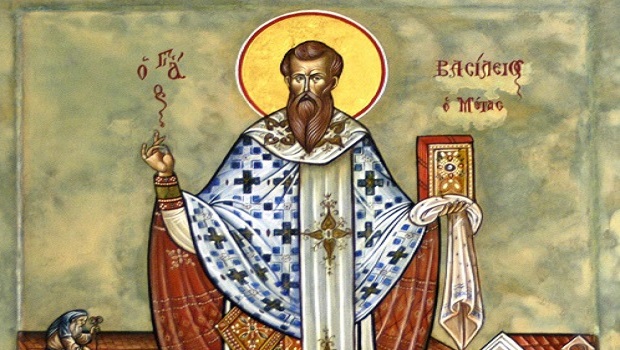Let Thy priests be clothed with righteousness, and let Thy saints shout for joy.
Psalm 132:9
As we continue our short unit on the Sacrament of Ordination, we have identified the three major ranks of the clergy—Deacon, Priest and Bishop. Over the next three days we will discuss the role of each in the contemporary church.
The rank we are most familiar with is that of the priest. Every parish has one. The role of the priest is to lead his respective parish. There are three duties of the priest—preaching, teaching and healing. Under preaching comes the Divine Services and Sacraments of the church, where he is the celebrant, or leader of the service. Also included in each service should be a sermon, an opportunity to preach the word of God. Second, the priest is a teacher. He conducts Bible studies, speaks to youth and adults in formal and informal groups. He teaches catechism to those coming into the faith as well as to those who are already Orthodox who want to learn more about the faith. The ministry of healing includes visiting those who are sick, in hospitals or in homes. It includes pastoral care and counseling. And most especially it includes the sacrament of confession, where the priest sits with people and hears their pains and sadnesses and offers guidance and encouragement. This is the ideal role of the priest. In real practice, the priest also is an administrator. He is intimately involved in the administrative affairs of his parish, attending meetings of the Parish Council and other ministries, providing the vision for the parish, and making sure the needs of the parish are being met—while he may not be in charge of stewardship, or the buildings and grounds, he is aware of these important parts of parish life. The priest, de facto, has also become an activities director, involved in youth activities, social activities, making sure that the parish has a balance of worship, learning, community building and service. The challenge to the priest, and I speak from personal experience, is that sometimes the administrative and activities pieces of ministry encroach on the teaching, preaching and healing that are foundational to the priesthood and leave the priest feeling like he is a cruise director at times. It is critical that there are competent people serving the parish, who can take charge of the administrative and social activities of a parish, so that the priest can give the proper time and attention to his roles of being teacher, preacher and healer.
The priest can conduct all the sacraments, except ordinations. Regarding the Sacrament of Chrismation, the priest may anoint someone with Holy Chrism. However, he cannot create Chrism. Only the Patriarch (or head of an autocephalous/self-governing church) can do that. When the Chrism is created, it is sent to each parish priest so he can use it when someone is Chrismated. The priest can initiate the sacraments of Holy Communion, Holy Unction and Holy Baptism. This means that he can take bread and wine, prepare them for the Divine Liturgy, and consecrate them to become the Body and Blood of Christ. He can take oil, pray over it with the service of Holy Unction and it becomes holy oil. And he can ask the Holy Spirit to come down on common water, and sanctify it so that someone may be baptized in it.
There are different “ranks” within the priesthood. The person newly ordained is a presbyter. He can lead the sacraments of Holy Communion, Holy Unction, Marriage, Baptism and Chrismation. He does not, however, hear confessions. This is a privilege granted by a bishop some time after ordination, usually a few years. This allows the new priest to mature in his offering of the services, preaching sermons and visiting the sick without the burden of having to hear confession. When the bishop deems it appropriate, he confers the title of “confessor” upon the priest who then is able to hear confessions from the people.
There are other “titles” given to priests, which in the modern world are honorary, but in the ancient church had practical responsibilities that went with them. Another rank of the priesthood is the “economos.” In the early church, the “economos” functioned as the “quartermaster” of the community. The word “economos” is closely related to the word “economist.” Before there were parish councils and treasurers as part of the parish administrative structure, the economos would manage the assets of the community. He would also receive the gifts people brought in order for the Divine Liturgy to happen. For instance, he would receive the offerings of bread and wine, oil, incense, candles, etc. When one entered into the church, they would bring their offering to the economos, who would then prepare the Gifts for the Liturgy in a room off the narthex called the “skevofilakion” or the room for the Holy Vessels. At the time of the Great Entrance, the deacons would make a procession down the side aisle of the church, receive the Gifts form the economos, and then take them up the middle aisle of the church and present them to the Protopresbyter, the chief celebrant of the parish, who would put them on the altar. In the modern church, there is no room off the side of the narthex. The Gifts are prepared on a table on the left side of the altar. In most communities there is only one priest, who carries the Gifts in procession at the Great Entrance, still using the ancient route of going down the side aisle and up the center aisle to transfer the Gifts to the Holy Altar Table.
Protopresbyter is an honorary title today, but in past centuries, it denoted who the first priest was in the community, at a time when communities were larger and served by many priests. Archimandrite is a title give to celibate priests, who are also give the privilege to stand at the head of the liturgical celebration. There is also the title of “Chancellor” which is more of an administrative title. The chancellor is the assistant to the bishop in his diocese or metropolis. A “vicar” is also an administrative title, and refers to a priest who leads an area of a diocese of metropolis. The administrative titles of chancellor and vicar can change, they are not permanent. The other ranks of the priesthood are permanent.
Every priest, when he is ordained, is given the consecrated Body of Christ from that Divine Liturgy, to hold in his hand, from right after the consecration until the time for Holy Communion. This is called the “Parakatathiki,” or the sacred charge of the priesthood. He is told by his ordaining bishop to “receive this Divine trust, guard it until the Second Coming of our Lord Jesus Christ, at which time He will demand it from you.” This is the scariest thing a priest will ever hear, and something that he will think about over the years, probably more so as he gets older. The charge is a meaningful one. A “trust” in financial terms, is a gift one receives from his or her parents, usually after they die. They can do what they wish with it. Just like a priest can express his priesthood according to his skills. I express mine with a lot of writing for instance. There is freedom and flexibility. However, there is also accountability. The priest know that he will stand before Christ and account for what he did with the people and the opportunities presented to him. The Parakatathiki represents every person he will ever encounter as a priest, and he must be careful not to lose any of the people to whom he ministers, lest he lose his own soul and salvation in the process. I think about this often as I get older. The priesthood does not make one into a saint. Priests are people. They make mistakes. I know I have lost people from my Parakatathiki through carelessness. This is why it is important to pray for priests and why I am always needing and grateful for your prayers, as well as your forgiveness for the times that I don’t represent Christ to people as well as I should.
The next vestments that the priest puts on, which are shared by all the orders of clergy, are the Epimanikia or cuffs. They are worn over the wrists of the priest, and remind him and us of the bound hands of Christ at the Passion, a reminder to watch what we are doing with our hands at all times.
Thy right hand, O Lord, glorious in power, Thy right hand, O Lord, shatters the enemy. In the greatness of Thy majesty Thou overthrowest Thy adversaries. (Exodus 15:6-7) Thy hands have made and fashioned me; give me understanding that I may learn Thy commandments (Psalm 119:73), always now and forever and to the ages of ages. Amen.
Make praying for your priest part of your daily prayer routine.



0 Comments